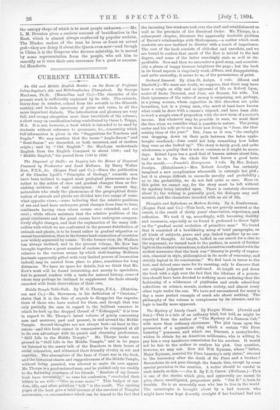Middle Temple Table-Talk. By W. G. Thorpe, F.S.A. (Hutchin- son
and Co.)-'-Mr. Stevenson, in his dedication of " Catriona," states that it is the fate of sequels to disappoint the expecta- tions of those who have waited for them, and though that was only partially the case in regard to the brilliant romance in which he took up the dropped thread of "Kidnapped," it is true in regard to Mr. Thorpe's latest volume of gossip concerning men and manners, past and present, in and around the Middle Temple. Second thoughts are not always best—at least in lite- rature—and this book cannot in consequence be compared at all to its own advantage with its quaint and charming predecessor, " Still Life in the Middle Temple." Mr. Thorpe broke new ground in " Still Life in the Middle Temple," and in its pages we listened to the merry talk of the Benchers in their hours of social relaxation, and witnessed their friendly rivalry in wit and repartee. The atmosphere of the Inns of Court was in the book, and the historical charm and suggestiveness of the Middle Temple, without being paraded, was allowed to make its own appeal. Mr. Thorpe is a good-natured man, and he yielded only too readily to the flattering overtures of his friends. " Readers of my former book have invariably," so runs his confession, " concluded their letters to me with= Give us some more.'" This budget of ran- dom, idle, and often pointless " talk " is the result. The opening pages of the book give a brief account of the survival of Templar ceremonies,—a circumstance which can be traced to the fact that the incoming law-students took over the staff and establishment MO well as the precincts of the dissolved Order. Mr. Thorpe, in a, subsequent chapter, discusses the apparently insoluble problem of Bacon's relationships with Shakespeare,—a matter which most students are now inclined to dismiss with a touch of impatience. The rest of the book consists of chit-chat and anecdote, and we are bound to confess that much of the first is trivial to the last degree, and some of the latter amazingly stale as well as un- profitable. Now and then we encounter a good story, and occasion- ally a gleam of happy humour brightens the page ; but the book in its broad aspects is singularly weak, diffuse, and disappointing, and quite unworthy, it seems to us, of the permanence of print.










































 Previous page
Previous page